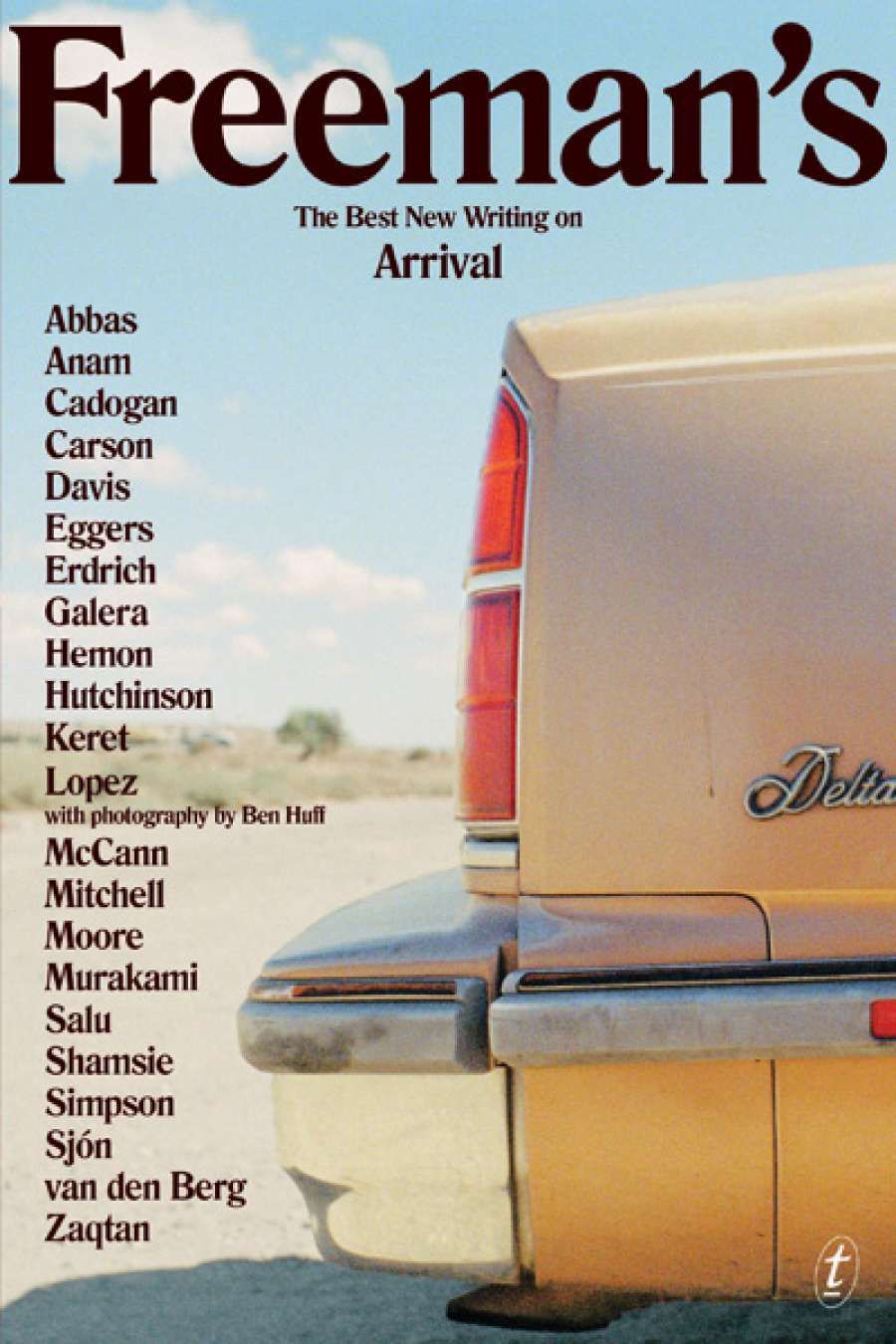
- Free Article: No
- Contents Category: Anthology
- Custom Article Title: Cassandra Atherton reviews 'Freeman's' edited by John Freeman
- Book 1 Title: Freeman's
- Book 1 Subtitle: Arrival
- Book 1 Biblio: Text Publishing, $32.99 pb, 304 pp, 9781925240221
Louise Erdrich begins 'Six Shorts' in the Turtle Mountains in North Dakota, where the graves glow with solar garden ornaments, placed there by people of the Chippewa Indian reservation community. The lights 'cast a wobbling greenish radiance ... keeping a vigil for our relatives' as they journey into their next life. This narrative introduces the pairing of arrivals with strange ghosting imagery, evident in the second 'short' authored by Kamila Shamsie. This traditional ghost story is hijacked by men described as 'something more unwanted than ghosts', when they question the author near the ancient site of Mohenjo-daro. Icelandic writer Sjón's story follows, probably the weakest in the sequence, where he is introduced to cosmobiology and contemplates how 'our dreams are connected with people on other planets'. It is is juxtaposed with Colum McCann's more accomplished piece set after the death of Seamus Heaney. In this narrative, the author visits his friend, writer Benedict 'Ben' Kiely, a few months before Kiely's death. Set at Dublin airport, McCann writes, 'When it comes to departures or arrivals, the dead, and even the living, meet in many forms.' It concludes with a haunting sense of familiar dissatisfaction: 'To abandon everything is a familiar story, perhaps especially to a poet. What we look for, then is some internal rhyme, most likely just out of reach.'
The penultimate story by David Mitchell is set in Hiroshima, where, after the dropping of the atomic bomb, 'restless ghosts [were] denied the Buddhist funerary rites required for the smooth passage to the next world'. Mitchell is haunted by a hibakusha ghost who does not want the author to look at him. In a similar way, Daniel Galera, in the final piece, is 'caught between two suicides' as he reads a biography of David Foster Wallace on a train in France that stops due to an 'accident involving a person'. These mini-autobiographies nestled together are bonded by their appeal to the strange and mysterious; they revel in that which remains unexplained.
'What Freeman lacks in his introduction, he makes up in his ability to draw a stellar cast of writers'
Haruki Murakami continues this theme in 'Drive My Car', which follows the burgeoning friendship between two lonely misfits: Kafuku, an ageing actor, and Misaki Watari, his young female chauffeur. Talking to her on his way to and from the theatre, Kafuku arrives at an important understanding about himself, following the death of his cheating wife. The quirky cross-generational friendship that develops in Kafuku's yellow Saab convertible is poignant and arresting in each of the character's moments of self-realisation, 'like the wings of a flying insect, now drawing closer, now fading away'.
 John Freeman
John Freeman
The bulk of the action in Etgar Keret's 'Mellow' also takes place in a car. The author is bullied into smoking a joint with his driver before his first paid book reading. On his arrival, he crawls up the stairs and opens his book to the first page only to find: 'It looked like a collection of oil globs floating on water, constantly changing shape in a fairly mesmerizing way. I stared at them a little longer. It was beautiful. I couldn't read anything, but it was really beautiful.' Equally amusing is Dave Eggers's 'The Fork' which follows the interior monologue of seventy-two-year-old Edward Henri who is embarrassed to find that he has a fork in his pocket at his daughter's wedding: 'He had no reason to have brought a fork along to the event, a wedding that he could have been reasonably sure would be providing its own silverware. So what could this mean, that he left the house with a fork from his own kitchen? The implications are many and all are problematic.' Keret and Eggers display comic brilliance in their narratives and demonstrate that the greatest short stories do not have to be angst-ridden, melancholic, or portentous.
Lydia Davis concludes the anthology with 'On Learning Norwegian', a strange and almost fantastical essay on how she taught herself to read a Norwegian book, '''cold'' – without looking anything up in a dictionary and without seeking help (hjelp) by turning to a native Norwegian'.
In Arrival, transnational narratives and poems explore the Freudian nature of the literary uncanny. Celebrating ambiguity and ambivalence, they examine the known and its relation to the unknown, resulting in an anthology of repressed returns or arrivals.


Comments powered by CComment